(Please reference Part I for relevant contextual information.)
Institutional Intrigue
Western institutions and their controlled appendages such as the UN are at the forefront of issuing veiled threats against the Macedonian government, and a simple glance at their copy-and-paste statements indicates the seamless level of strategic collaboration between them. In order of expanding scope and global importance, they are:
The EU:
Commissioner for European Neighborhood Policy & Enlargement Negotiations Johannes Hahn had this to say about the chaos in Kumanovo:
“I am deeply concerned at the unfolding situation in the Kumanovo region and possible injuries and loss of life. I urge the authorities and all political and community leaders to cooperate, to restore calm and fully investigate the events in an objective and transparent manner within the Law. I urge all actors for utmost restraint. Any further escalation must be avoided, not the least in the interest of the overall stability in the country.” (emphasis added)
Pay particular attention to the call for an “objective and transparent” investigation and for “all actors” and “political and community leaders” to demonstrate “utmost restraint” and “restore calm”. This is a theme that will subsequently be repeated by NATO and the UN, and the final sub-section will describe what these euphemisms are meant to represent.

NATO:
Now let’s take a look at what Secretary General Jens Stoltenberg thought about it:
“I am following the developments in Kumanovo with great concern. I express my sympathy to the families of those who were killed or injured. It is important that all political and community leaders work together to restore calm and conduct a transparent investigation to establish what happened. I urge everyone to exercise restraint and avoid any further escalation, in the interest of the country and the whole region.” (emphasis added)
Again, the same types of phrases are popping up, almost as if this statement was written by the exact same speech writer as the one who penned the EU’s response.
The UN:
Finally, check out Ban Ki-Moon’s commentary (as expressed through a spokesperson) on Kumanovo and see if any similarities can be found:
“The Secretary-General is alarmed by the recent violence in the city of Kumanovo in the former Yugoslav Republic of Macedonia and extends his condolences to the families of those killed and injured. He strongly supports the calls by the European Union and other members of the international community urging the state authorities and all political and community leaders to cooperate to restore calm and to fully investigate the events in an objective and transparent manner.
At this sensitive time, the Secretary-General calls on all actors to exercise maximum restraint and to refrain from any rhetoric and/or actions that may escalate tensions further. He also encourages the country’s authorities to address the concerns voiced by the Office of the High Commissioner for Human Rights on 17 March 2015 and to reaffirm their commitment to fundamental human rights and the rule of law by fostering an environment in which opposing views can be expressed freely.” (emphasis added)
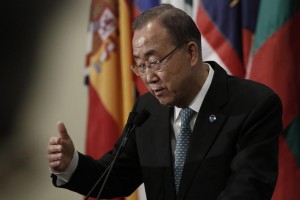
Aside from mirroring the previously highlighted statements, the UN leader jumps into the foray of domestic politics and Color Revolutionary rhetoric by trying to apply pressure against the Macedonian authorities. This shouldn’t be surprising in the least, as the UN has largely mutated into a supranational appendage of Western influence, so it’s unfortunately natural that this nominally neutral organization would become partisan to the West’s geopolitical games. Furthermore, it’ll be witnessed later on how Ban Ki-Moon’s domestic tinkering attempt in Macedonia perfectly complements the US Ambassador and friends’ victim shaming and intimidation from the day before.
Birds Of A Feather:
As the saying goes, ‘birds of a feather flock together’, and this quip rings true when it comes to Western institutions and their de-facto subordinates. The joint message being conveyed is that the Macedonian authorities themselves are complicit in the destabilization, hence why “all actors” must “exercise maximum restraint” and why a follow-up “objective and transparent” investigation is necessary. Going even further, this implies that the state’s resistance in combating terrorism helped contribute to it, implying that the country should have just rolled over and allowed the terrorists to take control of the city, or even worse, the entire country for that matter.
The invocation of “community leaders” is designed to create the sense that this was some kind of grassroots, local uprising, which it wasn’t at all, and is meant to drive a wedge between the government and local municipalities with significant Albanian populations like Kumanovo. From the look of it, it appears as though the West and its puppet UN appendage don’t support anti-terrorist operations unless they’re the ones conducting them and they’re being initiated for pro-Western geopolitical purposes. After all, this rhetoric against the Macedonian government is eerily reminiscent of the same type of statements being made against the Syrian one, which is also the regional anti-terrorism leader for its home area.
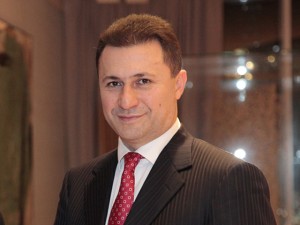
Attacking The Victim
Shaming:
The Ambassadors of the US, EU, France, UK, and Italy met with [Macedoniam PM Nikola] Gruevski two days after the attack as part of a prearranged meeting, during which they released a joint statement (read by US Ambassador Jess Baily, as it was) that can only be described as geopolitical victim shaming. As referenced by Reuters:
“In a statement read out by U.S. ambassador Jess Baily, the envoys criticised Skopje’s failure to address the “many allegations of government wrongdoing arising from the disclosures” published by opposition leader Zoran Zaev. “This continued inaction casts serious doubt on the government of Macedonia’s commitment to the democratic principles and values of the Euro-Atlantic community,” they said, adding that a lack of concrete action “will undermine Macedonia’s progress toward EU and NATO membership.””
What basically happened was that instead of showing solidarity with a European country in its fight against Mideast-trained (read: ISIL) terrorists that had just killed 8 police officers and injured a whopping 37 more, NATO (which is essentially what that group of governments collectively represent) took the opportunity to lambast the Prime Minister for not partaking in ‘regime tweaking’ and making it easier for the Color Revolution to succeed. One wouldn’t be mistaken for thinking that NATO is actually pleased that the terrorist attack was as violent and impactful as it was, since they and their affiliated media have been alluding that this is some type of punishment for the government’s ‘anti-democratic’ behavior as per the false Zaev allegations. It’s also significant that the US chose this joint occasion to make its first official remarks on the situation (there were no official State Department press releases about it) in conjunction with its NATO allies, and this needs to be elaborated upon further.
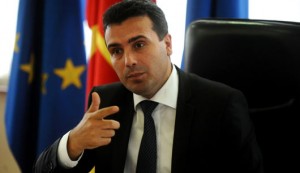
Intimidating:
The symbolism of the joint statement is that it’s a semi-official declaration of regime change intent by the US and its allies, who in essence served Gruevski with an ultimatum: he must either capitulate to a form of ‘organized’ regime change (‘regime tweaking’ and procedural moves to allow Zaev to slowly seize power) or face the wrath of a combined EuroMaidan Color Revolution 2.0 and a Greater Albanian-focused Unconventional War in forcing destructive regime change on the country. Gruevski and the Macedonians demonstrated that they will fight back and resist this aggression, which as was stated earlier, makes them the Syria of the Balkans in leading their regional anti-terror war. Hopefully, all comparisons can end there, although given the US template of chaos perfected in the Mideast, it’s likely that the struggle might become prolonged and internationalized, especially because of NATO-member Albania and NATO-protectorate “Kosovo’s” direct ideological and physical involvement.
Punishing:
Macedonia’s resistance to the unipolar Color Revolution and Unconventional War being unleashed against it is thus going to come with severe consequences. Judging by the NATO members’ joint statement on Macedonia annunciated by the bloc’s de-facto leader, the US, Macedonia isn’t ‘democratic’ enough for their liking and doesn’t embody the same Euro-Atlantic ‘values’, meaning that it’s slated to undergo the Syrian and Ukrainian ‘treatment’ to remedy these ‘ailments’. It was just explained how the country is defending against joint Color Revolution and Unconventional War offensives, but these indirect methods are expected to eventually evolve into a direct NATO war on Macedonia.
One such scenario could see a repeat of the 1999 NATO bombing of Serbia, but given Macedonia’s relatively smaller size and the denser concentration of Albanians along the country’s border with Greater Albania (Albania and “Kosovo”), a more militarily ‘efficient’ model will likely be deployed. This envisions conventional Albanian troops, under cover of NATO airstrikes (likely after the imposition of a ‘no-fly’ zone [always preceded by the destruction of the target country’s air force]), entering Macedonia and occupying the majority-Albanian-populated areas under the false pretexts of ‘humanitarian intervention’, ‘responsibility to protect’, and/or hypocritical anti-terrorism operations. A complement to this scenario could see irredentist Bulgarian troops in the east assist them by exploiting the chaos to indefinitely occupy territory that their nationalist politicians claim is historically their own as NATO’s reward for their earlier rejection of South Stream. Finally, a variation of both of these could see an Albanian and/or Bulgarian (joint) intervention supported by other NATO members that would fully occupy the country, change the government, alter the country’s constitutional name, and then partition the state between the Albanian and Slavic Macedonians.
Concluding Thoughts
The West has unequivocally launched a dangerous information war against the Republic of Macedonia, once which carries with it the threat of increasing violence and possible military occupation. While the conventional information consumer may not be aware of the importance of syntax and inference in reporting on geopolitical events, the fact remains that it’s an extremely pivotal factor in shaping the context and overall framework related to an event. From the snide inferences that the government brought last weekend’s horrible act of terror upon itself to shameless attempts at downplaying the atrocious militancy of the terrorists, each of these information offensives carry with them associated consequences in setting up the aggressors’ next move. By combating their falsehoods and proving the erroneousness of their assertions and intimations, individuals can learn the truth behind the terrorist attacks that the mass media is obscuring. The War on Macedonia isn’t a ‘civil war’ or ‘grassroots anti-government uprising’, but is contrarily part of a larger Western-supported proxy war against Russia and its Balkan Stream pipeline, one which has unfortunately taken the small geostrategic country of over two million people hostage and made it the West’s latest geopolitical target for execution.
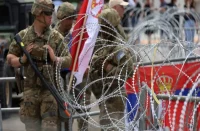

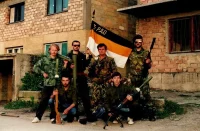











Pingback: Between The Lines: Western Public Support For Albanian Terrorism (I) | Oriental Review
Pingback: Between The Lines: Western Public Support For Albanian Terrorism (I) – OrientalReview.org